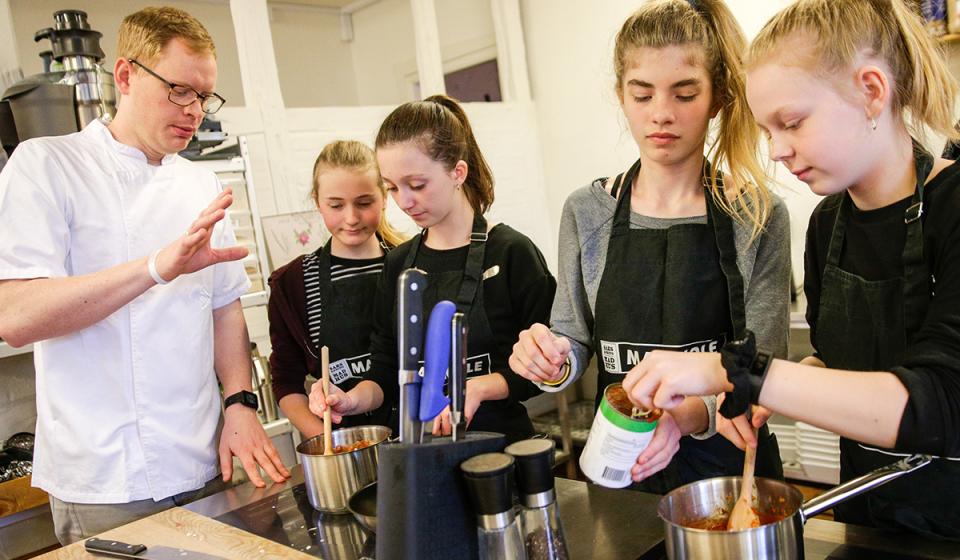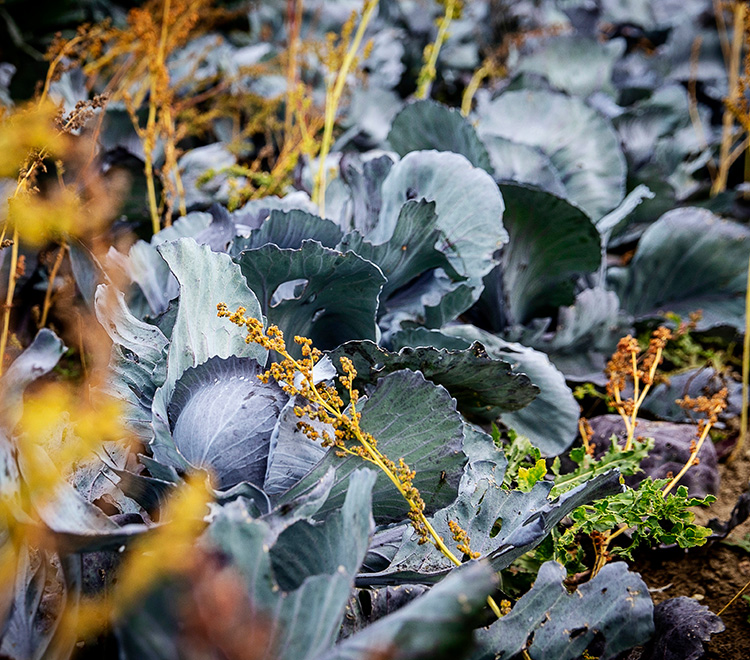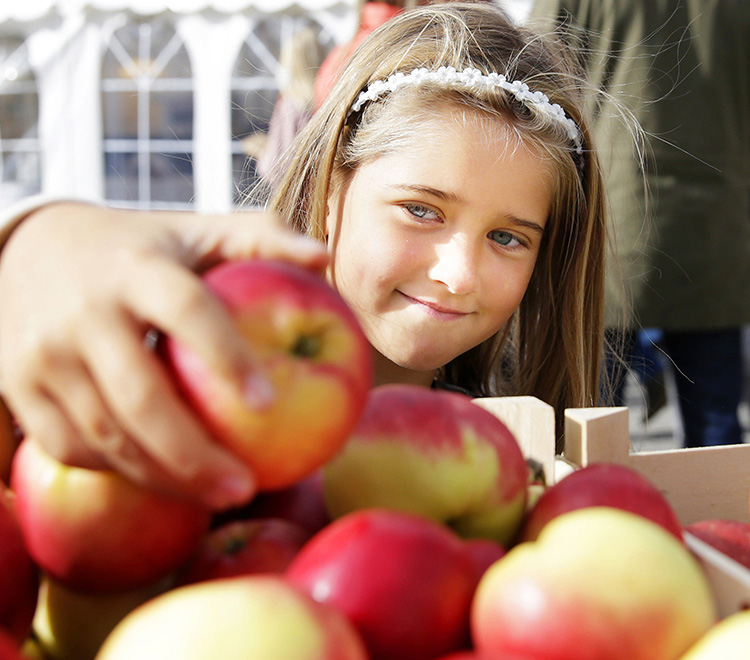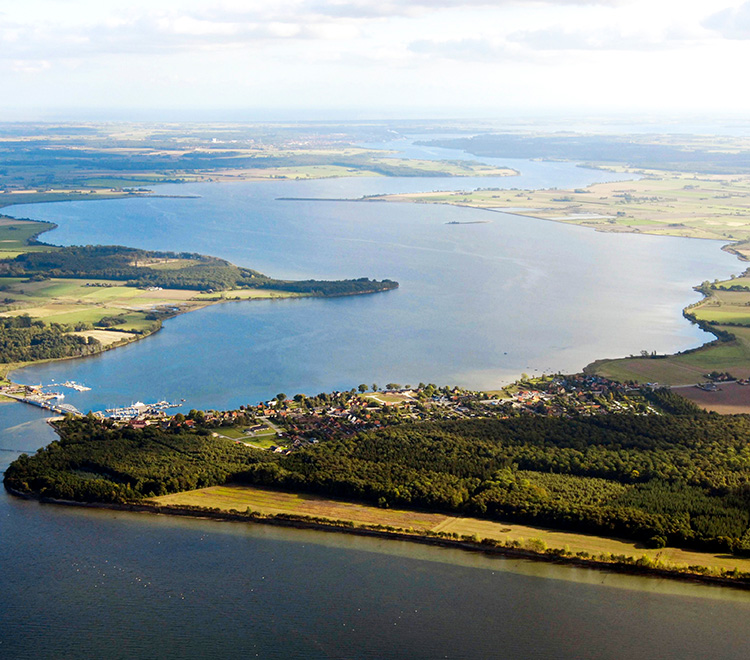The Living Lab of Guldborgsund Municipality aims to investigate how sustainable school meals can be made accessible to all students in the public school system.
As in most Danish municipalities, there is no common food program for schoolchildren in Guldborgsund Municipality. While a few municipalities in Denmark offer user-paid school food schemes, for the vast majority of children in Denmark, whether or not they eat during the school day is a private matter.
It is widely recognized that being well-nourished and hydrated has significant impacts on health, well-being, and academic readiness. Additionally, it has been observed that the prevalence of overweight children steadily increases from the beginning of primary school until the end of ninth grade. The Living Lab in Guldborgsund Municipality aims to investigate the feasibility of providing all children with access to healthy and nutritious meals during their time in school. This initiative will also collaborate with parents, schools and teachers to strengthen the curriculum in nutrition education.
The goal of this initiative is to improve the health, well-being, and learning capabilities of students, and to enable them to make healthy food choices throughout their lives.
Video in Danish with English subtitles
Who we would like to support
The primary target group for Guldborgsund Municipality's Living Lab are 1) school children, 2) parents, and 3) schools, including 4) the municipal school administration, 5) school management, 6) school boards and 7) teachers, who teach nutrition education. In addition, the lab also targets 8) managers of existing food programs in public schools.
The secondary target groups of the lab are: 1) the municipal council and, by extension, political parties; 2)the municipal administration, which includes the Public Health Department, the Culture and Leisure Department in relation to leisure and community work, and finance and legal affairs officers in relation to tenders and legal matters. The secondary target group relates to two municipal interventions, one focused on town planning in Sakskøbing (Sakskøbing byrumsprogram), and the other aimed at revitalizing Sakskøbing Town center (Frie bymidter).
The tertiary target group of the Living Lab are cooperating partners, such as 1)The Unity Kitchen in Sakskøbing 2)Business Lolland-Falster, as well as 3)local businesses, 4)local producers and the agricultural community, including consultancies, farmers and small holders,5) catering companies, 6) the media, and 7/) occasional training and business schools, with a view to stimulating enrolment into food-related secondary education programs.
In the Guldborgsund Living Lab, we aim to involve and integrate as many local partners as possible in exploring ways of providing a system for accessing school food and strengthening nutrition education.
What’s coming next
Introducing a scheme for school food in public schools is a challenging task, not only in terms of finances but also in logistics, responsibilities, cooperation, and administration.
Accordingly, the first step taken by the LL has been to define the challenge and facilitate discussions within the municipal administration to determine the political positions on exploring this matter. This step is not only the first but also the most critical for any efforts to be successful and lead to actual change in practice.
These consultations have already begun and will continue throughout 2023. It is only when a unified position is reached, along with realistic models and baseline calculations, that it will be possible to engage with tertiary target groups and stakeholders.
Local Food Challenges
As previously mentioned, there is no comprehensive system for school meals in Denmark, including Guldborgsund Municipality and most of the other 97 Danish municipalities. In a few places, such as Copenhagen, Aarhus and Læsø Municipalities, user-paid schemes have been introduced, but these are the exception. However, these experiences can provide valuable input and data that can benefit the efforts in Guldborgsund Living Lab.
The current situation results in many children eating too little, too poorly, or or not eating at all during the school day. Some parents and families face challenges in preparing healthy packed lunches because they lack skills, time, money, or other resources. At the same time, Guldborgsund, and Danish society as a whole, face increasing public health costs related to preventable lifestyle-related diseases.
Learning to prepare healthy and nutritious food and eating well are life skills that have a significant positive impact on the physical and mental health of both children and adults. Improving these skills in young people has the potential to impact public health expenditure on preventable lifestyle diseases in the long term.
- READ FULL TEXT
Studies show that many children stop eating packed lunches when they reach higher grades, typically around 7th grade, when many schools allow pupils to leave the school premises at lunchtime. The data shows that from approximately 13 years of age, 41% of the school children don’t eat lunch on a daily basis at school, with 11% indicating that they don’t ever eat during school hours.
Data from Guldborgsund Municipality indicates that about 5% of children show signs of being overweight when they start 1st grade, rising to approximately 20% when they finish school in the 9th grade. This figure rises to nearly 50% in the adult population. These trends are very important for the municipality's overall health profile, budget and the children's opportunities later in life.
Guldborgsund Municipality is an agricultural municipality with significant local food production. Since 2016, efforts have been made to organize local producers into a local network called "Muld Lolland-Falster, also known as “Muld”. Muld consists of participating businesses and is supported by Business Lolland-Falster, which is responsible for business promotion on Lolland-Falster.The network is supported by the two municipalities, Lolland and Guldborgsund, with a strong, municipal focus on tourism and local food culture. Muld Lolland-Falster works with a wide range of stakeholders to encourage innovative development in business, agriculture, and gastronomy in Lolland-Falster.
The members of Muld collaborate on logistics, marketing and sales of locally produced foods. The producers are important for the local food chain in the sense that they use local resources to create new, local values. They are innovative and create new workplaces, supporting local culture and products. It is a healthy and sustainable collaboration that benefits everyone.
However, there are structural impediments for young farmers in starting new businesses, and the number of local producers is slowly dwindling. There is a need for new producers and better access to agriculture for people who do not have easy access to the farming community, established connections, or a farming background.. Currently, upcoming legislation will further impede the possibility for starting new agricultural businesses through changes in taxation of farmland.
In this light, the possibilities of combining aspects of local food production with food education should be explored, perhaps with inspiration from the City of Copenhagen or elsewhere, such as Malmö Municipality. A local school food scheme could possibly be integrated with such initiatives, while strengthening local demand and food security.
Given this context and from a public health standpoint, Guldborgsund Municipality has become a part of the FEAST project. Our goal is to explore the potential for creating and utilizing school food programs and nutrition education as a lever to enance health, well-being and learning. Additionally, we aim to study how these efforts may impact local food production, marketing, and business development in our rural community.
Living Lab Activities
The provision of equitable and sustainable school meals for school children in public schools raises many questions, including its purpose, cost, financing, execution, responsibility, benefits, impacts, and consequences.
Thorough exploration of these questions to ensure the support and capacity to calculate and devise a system or model for providing food in public schools. Funding is a significant challenge that will have a determining impact on the outcomes, and it is crucial to view such efforts from a long-term cost-benefit perspective, including modeling the possible outcomes in relation to healthcare expenditure. It is also essential to consider the various perspectives of the target groups and stakeholders.
We plan to conduct in-depth discussions with the target groups and stakeholders, using different methodologies. For the school year 2024-25, we hope to carry out a pilot project in two selected schools, one that participates in the school food pilot test and one that does not. Based on the results, we will make recommendations on how to implement further trials or schemes on a larger scale and find ways to carry the plans into practice. Throughout this process, all the aforementioned target groups will be involved as relevant.
Get to know the region
Guldborgsund Municipality is situated in the southernmost part of Denmark and encompassed the the islands of Falster and the easternmost part of Lolland, covering an area of 903,2 km². The population of Guldborgsund Municipality was 60.376 as ofJanuary 1, 2023 and the main town is Nykøbing Falster, with a population of 16.911.
The second largest town is Sakskøbing, with approximately 4.595 inhabitants, and three other towns have populations of 2.000 to 4.000 inhabitants, namely Sundby, Nørre Alslev and Stubbekøbing. There are also 20 other villages and towns with populations between 250 and2000.
There are 14 public schools in Guldborgsund Municipality with the number of pupils ranging from 188 to 673, and an average of 346 pupils per school. The total number of pupils in public schools is 4.788. Additionally, there are four private schools with a total of 1002 pupils, but they fall outside the scope of this initiative, as they are not directly funded by the municipality. ,However, it is desirable that private schools also have access to any school food initiatives resulting from the work of the living lab, on market terms.
- READ FULL TEXT
Guldborgsund Municipality borders Lolland-Municipality (pop. 39.921), and together, the two municipalities are referred to as Lolland-Falster. Both are rural, farming areas, but the towns and villages of the islands provide infrastructure and opportunities for settlement, business development, and cultural diversity. Currently, the largest infrastructure development project in Europe is underway in the form of a fixed link to Germany under Femern Belt, connecting the island of Lolland with northern Germany.
The municipality is predominantly comprised of farmland, woods and 274 kms of coastline facing the Baltic Sea to the east, Femern Belt to the south, and the quiet, inland waters of Guldborgsund and the Småland Sea to the north. The farmland is the most expensive fertile agricultural land in Denmark, whereas the housing prices are among the cheapest in the country. The dominant agricultural activities in Guldborgsund Municipality are large-scale farming, with barley, wheat and sugar beet being the main crops,.The area is also known for fruit growing and pea cultivation, and in recent years, there has been an increasein the production of high-quality food products.
The total budget for Guldborgsund Municipality in 2023 is 644.422.517 euros, of which most is predetermined for regulated tasks and interventions set forth by the state. School food is not a compulsory municipal task, and it represents a major challenge, given the circumstances. Like most rural Danish municipalities, Guldborgsund Municipality struggles to meet the compulsory tasks, and austerity measures will alsmost certainly be necessary in the coming years.
At the same time, expenses related to public health issues are rising, which is also the case for Guldborgsund Municipality, highlighting the need for strategies for prevention strategies to avoid the further decline of the public heath profile. All in all, the work of the Living Lab is rife with challenges, but it also presents opportunities that can have a significant impact on the future. The FEAST projects provides a favorable environment for further exploring options for progress.
Frequently asked questions
- When was the living lab established, and how has it evolved over time?
The Living Lab has a brief history that dates back to 2016 when two municipalities commissioned a report on the potentials in tourism and agriculture on Lolland-Falster
The report concluded that there were significant potentials in agriculture,food production, and agri-tourism development, and that the focus of Business Lolland-Falster, the common business development organization, and the two municipalities should be on job creation and increasing local producer turn-over.
The “Peoples Food Summit” was Twas established in 2019 and held for the first time at Engestofte Estate on Lolland in May of that year. The summit brings together representatives from various parts of the food industry in Denmark, including politicians, ministers, food producers, media people, debaters, producers and buyers, school children, and locals, for two days of discussion on food production and consumption. The aim of the summit is to create new insights and perspectives on the food we make and consume, and on the food systems that provide the framework for many people's diets. The event has been repeated in 2021 and 2022 and will be held for the fourth time on June 2-3, 2023, attracting around 8000 visitors.
As a preparation for the food summit, a “catalogue” called “Muld Lolland-Falster”, in Danish, German and English was developed to showcase local producers and restaurants that rely on local production in their menus. This led to the establishment of a sales platform for local products and other initiatives, such as potential cooperation within the framework of FEAST and the creation of cross-border "food routes" accessible in the app “Naturlandet Lolland-Falster” (The Nature Country Lolland-Falster).
The Living Lab also collaborated on establishing a Food School in Sakskøbing, offering cooking classes and nutrition education to public school children in Guldborgsund Municipality. The courses will be tailored to suit the needs of children with special needs, children in 7th-9th grades with electives in nutrition education, and children attending the municipal youth clubs. The Food School in Sakskøbing will start operating from August 2023, offering 120 courses to the above mentioned four target groups.
Overall, the Guldborgsund Living Lab focuses on exploring the possibilities of providing sustainable school meals for all public school schoolchildren, strengthening the curriculum in Nutrition Education, and other related initiatives within the local food supply and food production value chains, all seen in a sustainability and public health-oriented perspective.
- Who are the key stakeholders involved in the living lab?
The stakeholders of the Guldborgsund Living Lab are individuals or groups who have a direct or indirect interest in the lab's activities and outcomes. Those highlighted in bold are the most important stakeholders in the Living Lab.
The primary target groups are: 1)school children, 2)parents, and 3)schools,3 as well as 4)the municipal school administration, 5)the management of the schools, 6)the school boards and 7/teachers, who teach nutrition education, and 8)managers of existing food programs in public schools.
The secondary target groups are: 1)The municipal council and, by extension, the political parties; 2)the municipal administration, including the Public Health Departement, the Culture and Leisure Departement, in relation to leisure and community work, as well as finance and legal affairs officers, in relation to tenders and legal matters. Two municipal interventions related to town planning and vitalizing Sakskøbing Town center are also included.
The tertiary target groups are cooperating partners, such as 1)The Unity Kitchen in Sakskøbing and 2)Business Lolland-Falster, as well as 3)local businesses, 4)local producers and the agricultural community (consultancies, farmers and small holders), as well as 5)catering companies, 6)the media, and 7)vocational training- and business schools, with a view to stimulating enrolment into food-related secondary education programs.
The Guldborgsund Living Lab aims to involve and integrate as many local partners as possible in exploring ways of providing a system for access to school food and strengthened nutrition education.
Guldborgsund Municipality
Department for Strategy and Development, Center for Policy and Personnel
Carina Bell Bastlund Woollhead
Parkvej 37, 4800 Nykøbing Falster
Denmark
www.guldborgsund.dk



